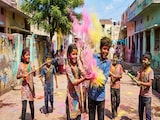- Ganesha idols must be made from natural, biodegradable materials, said Tamil Nadu Pollution Control Board
- Plaster of Paris, plastic, thermocol, and toxic paints are strictly banned for idol making
- Ornaments should use dried flowers and straw, with natural tree resins for shine only
With Ganesh Chaturthi set to be celebrated across Tamil Nadu on August 27, the Tamil Nadu Pollution Control Board (TNPCB) has issued a set of guidelines urging devotees to opt for eco-friendly idols and to ensure that immersion activities do not pollute waterbodies.
In an official release, the TNPCB emphasised that idols should be made entirely from natural, biodegradable, and eco-friendly raw materials, avoiding any toxic or inorganic substances.
The use of traditional clay and mud has been recommended, while materials such as Plaster of Paris (PoP), plastic, and thermocol (polystyrene) have been strictly prohibited.
The board stated that only such eco-friendly idols will be permitted for safe immersion in designated waterbodies.
To maintain environmental integrity, it has also specified that ornaments for the idols should be crafted using dried flower components and straw.
For enhancing the idol's appearance, only natural tree resins may be used as a shining material. “The use of single-use plastic and thermocol in any form shall not be permitted,” the statement read, highlighting the importance of reducing non-biodegradable waste during the festival.
In addition, the TNPCB has banned the application of toxic and non-biodegradable chemical dyes and oil paints on idols. It advised against the use of enamel and synthetic dye-based paints, instead encouraging artisans to adopt eco-friendly alternatives such as water-based, biodegradable, and non-toxic natural dyes.
To further prevent pollution, the board has instructed that idol immersion should be carried out only at locations specifically notified for each district by the respective district administrations. These directions align with the guidelines of the Central Pollution Control Board (CPCB), which aim to protect aquatic ecosystems from contamination during mass idol immersions.
Vinayaka Chaturthi, one of Tamil Nadu's most widely celebrated festivals, often sees large-scale installation and immersion of idols. However, in recent years, environmentalists and civic authorities have raised concerns over the impact of non-biodegradable materials and toxic paints on lakes, rivers, and coastal waters.
The TNPCB's move is expected to promote more sustainable celebrations while preserving traditional practices. The board has appealed to the public, idol makers, and organisers of community celebrations to strictly follow the guidelines and contribute towards a cleaner and greener festival.
(Except for the headline, this story has not been edited by NDTV staff and is published from a syndicated feed.)















